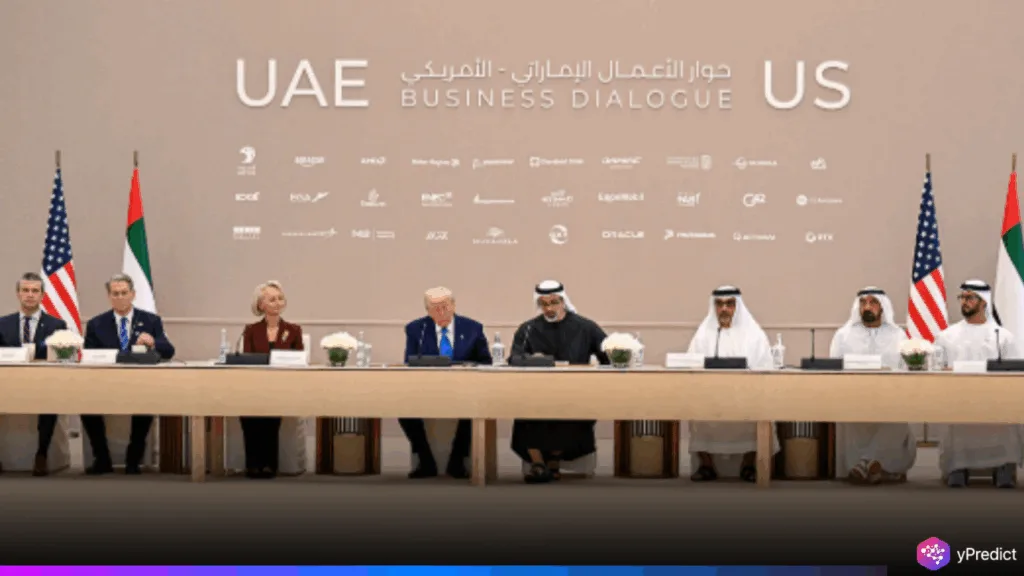
A proposed multi-billion-dollar AI data center campus in the UAE, announced during President Trump visit, remains far from finalized. Despite public promotion as a U.S. tech win, national security concerns stall the deal. U.S. officials are wary of the UAE’s deep ties with China, fearing American AI chips might be diverted or compromised. Abu Dhabi pledged alignment with U.S. security standards, but enforcement and technology safeguards are unresolved. The Stargate UAE project, backed by G42 and U.S. tech firms including Nvidia and Oracle, aims to power a massive AI hub, but regulatory approval is still pending.
Security, Sovereignty, and Silicon: The Core Hurdles of Stargate UAE
The Stargate UAE project, led by Emirati firm G42 with U.S. collaborators like Nvidia, OpenAI, Oracle, and Cisco, proposes a 10-square-mile AI data campus launching in 2026. Despite ambitions, it’s stuck in diplomatic limbo. The Biden and Trump administrations have raised long-standing concerns over the UAE’s strategic hedging, its growing ties with China, and previous deployments of Huawei’s 5G tech. U.S. agencies remain undecided on how to enforce chip export security, especially for Nvidia’s advanced Grace Blackwell GB300 AI systems. Washington is reportedly considering a ban on Chinese tech and Chinese nationals working at the site, adding more friction.
Abu Dhabi has pledged reforms and even removed Chinese hardware under U.S. pressure. Microsoft invested $1.5 billion in G42 as a signal of compliance. However, major Chinese players like Huawei and Alibaba Cloud remain active in the country. Meanwhile, intelligence sources have flagged smuggling networks routing AI chips through Gulf countries like the UAE to China. Trump officials claim the project will be “American-managed,” but both Democrats and Republicans voice skepticism about the UAE’s reliability as a tech partner. With no timeline for resolution, this AI mega-campus remains a geopolitical flashpoint, not a done deal.
Why the U.S. Hesitates: Strategic Doubts and a Clouded Partnership
Despite Trump’s public embrace of the Stargate UAE initiative, Washington insiders are deeply divided. The UAE’s complex relationships with China, Russia, and sanctioned actors pose red flags. U.S. officials question whether safeguards, including restrictions on Chinese technology and personnel, can be effectively implemented. The lack of a clear export-control framework only deepens uncertainty. Several sources told Reuters the UAE must accept future U.S. oversight terms before chip transfers can proceed, but those conditions remain undefined.
Security experts argue that the UAE’s strategic hedging behavior is not new. Even after removing Chinese components from the G42 infrastructure, Huawei and Alibaba maintain operational presence. Moreover, U.S. agencies are investigating UAE-linked entities in AI chip smuggling rings to China, adding to unease. The Commerce Department and the White House have offered no concrete updates.
The Trump administration insists the AI campus will boost U.S. tech influence in the Gulf and keep China at bay. However, bipartisan voices in Congress are pressing for stricter scrutiny and clearer accountability. For now, the Stargate UAE project serves more as a diplomatic chess piece than a secured data infrastructure breakthrough. Whether it will become a model for U.S.-led AI dominance or a cautionary tale remains uncertain.
Abu Dhabi’s Ambition Meets Washington’s Caution on AI Future
The UAE wants to be a global AI leader, but U.S. security concerns may delay its progress. The proposed data center, planned to run on 100,000 Nvidia chips, would represent one of the world’s largest AI hubs. Still, the project hinges on unapproved U.S. tech exports and untested promises from Abu Dhabi. Until regulatory frameworks are solidified and bipartisan doubts addressed, Stargate UAE remains a strategic ambition, caught in limbo between economic promise and geopolitical risk. With cloud sovereignty, AI power, and national security on the line, the future of this transcontinental AI alliance is still anything but certain.






